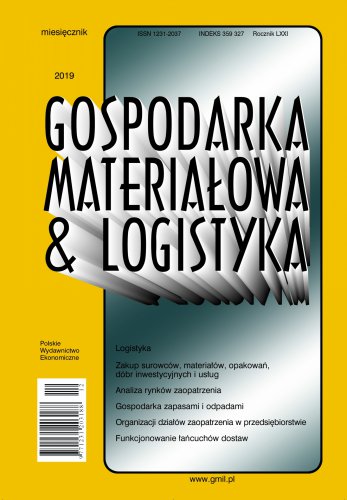The influence of selected components of the knowledge management system in enterprises on the level of complaints
The basic possibilities of modern enterprises depend on the ability to create, transfer, integrate and use knowledge. It is a key element enabling identification and effective use of accumulated potential. Many elements in the focus of knowledge management is shared with the processes of logistics management. What is more, their goals overlap in many areas. The main goal of logistics management — according to the theories presented in the literature — is to maximize the value provided to customers while minimizing the costs incurred as a result of managing all related activities of the flow of materials and goods from sources of supply to the user of finished products. The aim of the article is to present the results of research conducted on a group of 105 companies in the context of the impact of selected elements of the knowledge management system on the level of complaints in the surveyed companies.
References
Bibliografia
Argote, L., Ingram, P. (2000). Knowledge Transfer: A Basis for Competitive Advantage in Firms. Organizational Behavior and Human Decision Processes, 82(1). https://doi.org/10.1006/obhd.2000.2893.
Bergeron, B. (2003). Essentials of Knowledge Management. New Jersey: John Wiley&Sons.
Bukowitz, W. R., Williams, R. L. (2000). The Knowledge Management Fieldbook. London: Prentice Hall.
Calo, T. J. (2008). Talent Management in the Era of the Aging Workforce: The Critical Role of Knowledge Transfer. Public Personnel Management, 37(4), 403–416. https://doi.org/10.1177/009102600803700403.
Chang, H. H., Chuang, S. S. (2011). Social capital and individual motivations on knowledge sharing: Participant involvement as a moderator.
Journal Information and Management, 48(1), 9–18. https://doi.org/10.1177/009102600803700403.
Cui, A. S., Wu, F. (2016). Utilizing customer knowledge in innovation: antecedents and impact of customer involvement on new product performance. Journal of The Academy of Marketing Science, 44(4), 516–538.
Cummings, J. N. (2004). Work groups, structural diversity and knowledge sharing in a global organization. Management Science, 50(3), 352–364. https://doi.org/10.1287/mnsc.1030.0134.
Dale, B. G., Cooper, C. (1992). Total Quality and Human Resources: An Executive Guide. Oxford: Blackwell.
Davenport, T. H., Prusak, L. (1998). Working Knowledge. Brighton: Harvard Business School Press.
De Long, D. W., Fahey, L. (2000). Diagnosing Cultural Barriers to Knowledge Management. Academy of Management Executive, (14), 113–127. https://doi.org/10.5465/ame.2000.3979820.
Garavan, Th. N., Gunnigle, P., Morley, M. (2000). Contemporary HRD Research: a Triarchy of Theoretical Perspectives for HRD. Journal of European Industrial Training, 24(2–3–4), 466.
Gierszewska, G. (2011). Zarządzanie wiedzą w przedsiębiorstwie: modele, podejścia, praktyka. Warszawa: Oficyna Wydawnicza Politechniki Warszawskiej.
Hu, L., Randel, A. E. (2014). Knowledge Sharing in Teams: Social Capital, Extrinsic Incentives, and Team Innovation. Group & Organization Management, 39(2), 213–243. https://doi.org/10.1177/1059601114520969.
Huang, Q., Davison, R. M., Gu, J. (2011). The impact of trust, guanxi orientation and face on the intention of Chinese employees and managers to engage in peer-to-peer tacit and explicit knowledge sharing. Information Systems Journal, (21), 559–562.
Jolink, M., Dankbaar, B. (2010). Creating a climate for inter-organizational networking through people management. The International Journal of Human Resource Management, 21(9), 1436–1453. https://doi.org/10.1080/09585192.2010.488445.
Kowalczyk, A., Nogalski, B. (2007). Zarządzanie wiedzą; koncepcja i narzędzia. Warszawa: Difin.
Lee, H., Choi, B. (2003). Knowledge Management Enablers, Processes and Organizational Performance. Journal of Management Information Systems, 20(1), 179–228.
Leja, K., Szuwarzyński, A. (red.) (2007). Zarządzanie wiedzą: wybrane problemy. Gdańsk: Wydawnictwo Politechniki Gdańskiej.
Lemon, K. N., Verhoef, P. C. (2016). Understanding Customer Experience Throughout the Customer Journey. Journal of Marketing, 80(6), 69–96. https://doi.org/10.1509/jm.15.0420.
Lepak, D. P., Snell, S. A. (2002). Examining the Human Resource Architecture: The Relationships among Human Capital, Employment, and Human Resource Configurations. Journal of Management, 28(4), 517–543. https://doi.org/10.1016/s0149-2063(02)00142-3.
Liao, K., Xiong, H. (2011). Study on Knowledge Sharing of Community of Practice Based on Social Network Perspective. I-Business, (3), 283–286.
Li-Fen, L. (2006). A learning organization perspective on knowledge sharing behavior and firm innovation. Human Systems Management, 25(4), 387–404.
Lipka, A., Król, M., Waszczak, S., Winnicka-Wejs, A. (2010). Kształtowanie motywacji wewnętrznej. Koszty jakości i ryzyko. Warszawa: Difin.
Łobejko, S. (2005). Systemy informacyjne w zarządzaniu wiedzą i innowacją w przedsiębiorstwie. Warszawa: Szkoła Główna Handlowa.
Michailova, S., Husted, K. (2003). Knowledge-Sharing Hostility in Russian Firms. California Management Review, 45(3), 59–77.
Mikuła, B., Pietruszka-Otyl, A., Potocki, A. (red.). (2007). Podstawy zarządzania przedsiębiorstwami w gospodarce opartej na wiedzy. Warszawa: Difin.
Nonaka, I., Takeuchi, H. (1995). The Knowledge-Creating Companies: How Japanese Companies Create the Dynamics of Innovation. New York: Oxford University Press.
Nonaka, I., Takeuchi, H. (2000). Kreowanie wiedzy w organizacji. Jak spółki japońskie dynamizują procesy innowacyjne. Warszawa: Poltext.
Perechuda, K. (red.). (2005). Zarządzanie wiedzą w przedsiębiorstwie. Warszawa: PWN.
Sarvary, M. (1999). Knowledge Management and Competition in the Consulting Industry. California Management Review, 41(2), 95–107. https://doi.org/10.2307/41165988.
Sopińska, A. (2010). Wiedza jako strategiczny zasób przedsiębiorstwa. Analiza i pomiar kapitału intelektualnego przedsiębiorstwa. Warszawa: Oficyna Wydawnicza Szkoła Główna Handlowa.
Stabryła, A., Cabała, P., Mesjasz, C., Piekarz, H., Woźniak, K. (2008). Metoda kategoryzacji jako narzędzie oceny potencjału wiedzy przedsiębiorstw. W: J. Rokita (red.), Ku nowym paradygmatom nauk o zarządzaniu. Katowice: Górnośląska Wyższa Szkoła Handlowa im. Wojciecha Korfantego.
Szabó, L., Csepregi, A. (2011). Competences Found Important for Knowledge Sharing: Investigation of Middle Managers Working at Medium-and Large-Sized Enterprises. IUP Journal of Knowledge Management, 9(3), 41–58.
Tschannen-Moran, M., Woolfolk Hoy, A. (2001). Teacher Efficacy: Capturing an Elusive Construct. Teaching and Teacher Education, (17), 783–805. https://doi.org/10.1016/s0742-051x(01)00036-1.

